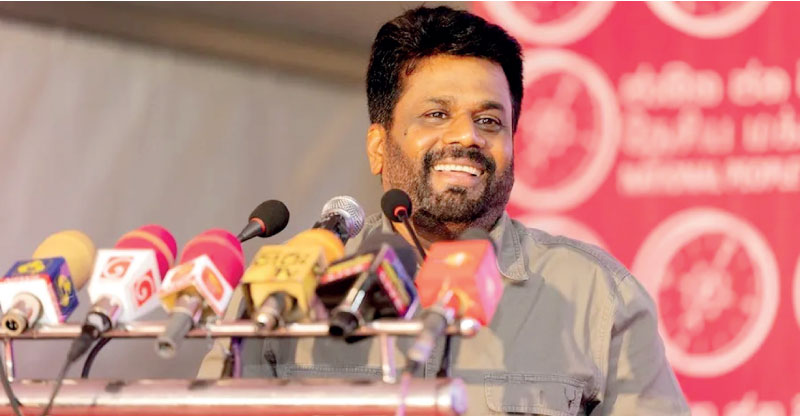Tuesday Feb 17, 2026
Tuesday Feb 17, 2026
Monday, 4 March 2024 00:10 - - {{hitsCtrl.values.hits}}

Anura Kumara Dissanayake
|
 It is rare for an opinion piece published more than a year ago to draw a response (https://www.ft.lk/columns/NPP-s-stance-on-foreign-investment-Unravelling-misconceptions/4-758938). I know that the published Sinhala version was sent to Anura Kumara Dissanayake (AKD). I would have been happier to get a direct response. But some engagement, even a year late, is better than none.
It is rare for an opinion piece published more than a year ago to draw a response (https://www.ft.lk/columns/NPP-s-stance-on-foreign-investment-Unravelling-misconceptions/4-758938). I know that the published Sinhala version was sent to Anura Kumara Dissanayake (AKD). I would have been happier to get a direct response. But some engagement, even a year late, is better than none.
The speech that I was responding to is still available at https://www.facebook.com/anurakumara/videos/911611106686653 for anyone to view. I was specifically referring to the JVP’s firm resolve to prohibit foreign investment in the generation of electricity based on wind (at 46:27 of the above video) and not about the JVP’s stance on foreign investment generally (the title, “JVP’s plan to exclude foreign investors from the energy sector” says so in large letters). The conclusion:
“Renewable energy has many advantages. But it is foolish to imagine that no foreign exchange is involved just because the wind blows over our land. Before those seeking to rule this country pontificate on policy, they should take the trouble to understand what is involved in efficiently producing electricity at a price and in a form appropriate for a modern energy system. Ideology cannot substitute for a correct understanding of technological and economic realities.”
But let’s leave the renewables debate aside and engage in the author’s preferred territory, foreign investment.
What’s wrong with the JVP’s stance on FDI?
In his talk at the Galadari early last year, AKD stated that a JVP government would maintain strict control over the energy and finance sectors, and would not allow FDI in renewables. He stated that the JVP was open to discussion on the rest of the economy.
That translates into discretion. It is no different from the current procedure for approving FDI through the Strategic Development Projects Act. This legislation from the first Mahinda Rajapaksa administration gives broad discretion to ministers and their appointees at the Board of Investment.
As the IMF governance diagnostic states: “substantial corruption vulnerabilities are created through the granting of high-value and long-lasting concessions for investments determined to be of strategic importance in a process that lacks clarity and transparency.” The recommendation is: “Abolish or suspend application of the Strategic Development Projects Act until promulgation of explicit and transparent process for evaluation of proposals and costing of investment promotion conditions.”
Explicit and transparent processes. Not discussions with Government decision makers, however clean they think they are. There is a lack of appreciation of the value of limiting discretion among all politicians, but this is especially pronounced among those who believe they occupy a moral high ground.
Why not eliminate discretion altogether? This may be achieved in certain areas like the issuance of permits, but for complex projects discretion cannot be eliminated, only bounded by transparent procedures.
Clear rules may include prohibitions of the type AKD talks about. But as I showed in my 2023 article, it makes no sense to prohibit investment in renewables which require significant foreign-made inputs: “Ideology cannot substitute for a correct understanding of technological and economic realities.”
The National Plan nostrum
The author of the rejoinder intuits that AKD’s pronouncement may not be enough. How, according to him, should decisions regarding FDI be taken? They should be “in harmony with the national agenda, ensuring that they contribute meaningfully to the country’s progress… One of the core principles of the NPP’s approach is the adherence to a comprehensive National Plan. This ensures that foreign investments are channelled into sectors that align with the country’s needs and priorities, fostering sustainable economic growth and development.”
So, instead of negotiating with the JVP ministers, those wishing to invest in Sri Lanka will have to study the comprehensive National Plan.
National plans cannot be cut and pasted from election manifestos. In a chapter in a 2004 book on Economic Policy in Sri Lanka, Godfrey Gunatilleke described the process in his review of national planning in Sri Lanka: “A National Planning Council (NPC) was established by an Act of Parliament, with the Prime Minister as Chairman, the Minister of Finance as Deputy Chairman, and eminent professionals drawn from various fields, both in the public as well as private sectors, as additional members. Its role was exclusively advisory. It was serviced by a Planning Secretariat manned by economists and other professionals… Preparation of the plan took three years.”
Gunatilleke’s account was of “the high watermark” of national planning in Sri Lanka, 1956-65. One may argue that the world has changed. It has, indeed. But has it changed so much that it is possible to come up with a plan in less than two years? Without well-resourced experts and broad consultation processes? And what does one do meanwhile, in the first 2-3 years of the hoped-for JVP government? Tell the potential investors to come when the plan is ready?
Even if such a Plan was made after 2-3 years, would it work? Could it address the rapidly changing threats and opportunities that our economy faces?
The Gosplan of the former Soviet Union was the epitome of national planning. Central planning is premised on a conceptualisation of the economy as clockwork machine. One moves a piece here and changes happen smoothly elsewhere. One knows where one’s machine (the national economy) ends, and other machines begin. The planner can control what happens in his/her national economy.
Even with a large national economy that was insulated from the world economy, the Gosplan failed. Its failure was predicted by Friedrich Hayek in a 1945 article entitled “The use of knowledge in society.” He argued that planning was destined to fail under conditions of highly imperfect information. It did.
The present global economy is highly interdependent. The information problems experienced by the large, isolated Soviet economy are exacerbated in a small, globalised economy like ours, however much individuals representing the party in the past tried to “remove the plugs” connecting us to the world.
National plans have not worked in Sri Lanka or anywhere else. The Indian Planning Commission has been redesigned and renamed.
Can there be sectoral policies? Yes, there should be national policies for specific sectors that are based on evidence and broad stakeholder consultation, even in rapidly changing fields such as digital. They should not change every time a Government changes or a minister is appointed. But they should be reviewed and modified as circumstances change. Should efforts be made to articulate sector policies? Yes, to a limited extent. An approach that accepts the imperfection of information and difficulties of articulation and seeks a balance between workable certainty and flexibility is what will work.
The JVP has come a long way from Wijeweera’s promises to expropriate all foreign investments without compensation and from Weerawansa’s more recent nonsense. Hopefully, these exchanges will help the JVP shed some more of the ancient baggage they’ve been carrying, starting with the national plan nostrum.